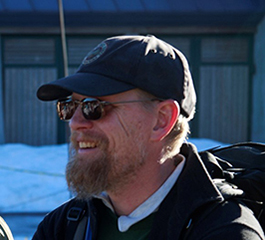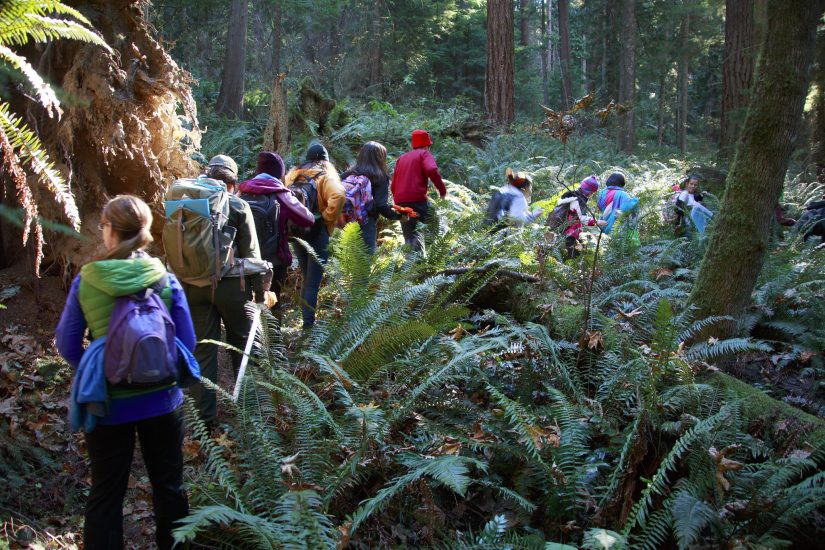Program Spotlight: Mount Rainier Institute
An Interview with Director John Hayes
 We had the opportunity to speak with MRI Director John Hayes about the importance of outdoor, immersive experiences and what they mean for the future of ecological literacy and environmental stewardship.
We had the opportunity to speak with MRI Director John Hayes about the importance of outdoor, immersive experiences and what they mean for the future of ecological literacy and environmental stewardship.
What makes the MRI locations so unique for this type of environmental learning?
My career has been spent working at outdoor schools in national parks, specifically in overnight, immersive experiences. It really is a hands on, outdoor learning experience. Here at the Mount Rainier Institute (MRI) we have a volcano right down the road from us. This experience is so unique because of our access to both Mount Rainier National Park and Pack Forest. Pack Forest has a 100 year history of educational work and demonstrated land management. There are fewer restrictions at Pack Forest than at MRNP.
Here at Pack Forest we have a lot more freedom to do hands-on work and mindfully go off-trail, something that you simply can’t do in a national park. One Pack Forest program that we run with older students involves coring trees to measure growth. Again, you could never do that in a national park. This experimental forest is where we can really do experiments. We interface with researchers who are in the field performing research. Face-to-face interaction with scientists makes this program so special and unique. We’re teaching kids to be scientists and inspiring the next generation of stewards.
How do these overnight experiences help steward ecological literacy?
The MRI immersive experience can have a profound impact on students, especially those who don’t have the opportunity to spend a lot of time outdoors. These immersive, multi-day overnights are not the same as just getting outside – they stretch your comfort zone and this is where the best learning happens. I liken it to learning a foreign language – the most impactful way to learn a new language is to be immersed in the place and the space, so to speak.
There is evidence that suggests immersion is so imperative to concretizing memories. This is akin to ecological literacy because this experience is about being outdoors in a more intense, immersive way. The students create lifelong memories, illuminating career paths that they would never have thought possible. MRI teaches us that science can be a fun outdoors experience beyond the beakers and white lab coats.
MRI helps students to get to know what’s in their literal and figurative backyard. Anyone that’s from Washington can come and get a sense of what this state is all about. We are all impacted by this massive mountain range that bisects the state – from our water resources, the salmon, and an impact on our daily lives.
What is a common participant revelation after attending a multi-day overnight experience?
We have some big picture goals that we have for all students and we like to use the acronym EPIC. 
Education — we lean on science but there are other topics we delve into. A common revelation we hear out loud is, “I didn’t know I liked science.” Here, they learn science can be learning about climate change, measuring the diameter of trees, and field work outside. MRI is all about hands-on science. We have an inquiry-based science day where MRI staff facilitates a process in Pack Forest’s old growth area, and so there is an appreciation of nature. That sparks curiosity and those curiosities are then turned into researchable questions.
For example, are there more mushrooms on nurse logs than on the forest floor? Then the staff helps put together a plan/methodology for figuring that out using science. They help students collect data, analyze data and share the findings through a presentation to the rest of the cohort. Science is about being curious and trying to find the answer. It’s not about learning specifics of old growth forests, but rather, learning the science process to make sense of and improve the world around us. Mistakes are part of this process and we welcome mistakes.
Place Connection — MRI helps students become attached to their place in this world. Place attachment is key to the heart of what it is we’re doing here at MRI. Our goal is to enhance students’ motivation to learn. About 70-80% of students that come to the program have never been to a national park. This “place connection” is about first experiences outdoors. Or maybe they’ve never seen salmon in a stream or heard a raven fly overhead. Another revelation. One of the best examples is students saying, “I love this. I want to come out here and go hiking with my family.” They want to share their experience and return to nature.
Inspiration — we want to inspire kids. Our students are inspired by the smallest things. How we teach science for example. Inspired by meeting a new friend and connecting with other students. There are many examples of students who participated in the program early on and now are in college studying forest ecology. Kids changed their trajectory in life after coming to the overnight immersive experiences here at MRI.
Community — Students are living/eating together in cabins, in learning/trail groups together all day, a lot of close community time. Teachers that bring students often say that when they got back from the shared experience it positively impacted their community back at school. Makes for a positive community piece back at school. Students get to know and stay connected with their teachers and have experiences that they wouldn’t otherwise have.
What is one way that UW students, staff and alumni can support MRI’s mission?
If you have kids, help spread the word about the program. Tell your schools, teachers and administrators that this opportunity exists. We are always in need of more champions for outdoor education.
We’re always working on trail maintenance at Pack Forest and we rely heavily on volunteers – they make it all possible. Pack Forest sees close to 50-60 thousand visitors each year that come to hike the trails. We aren’t a state park and have limited resources with maintenance so these opportunities to volunteer are super helpful for the forest. This area is very popular because it’s only 1.5 hours from Seattle and one hour from Tacoma and it’s free to come and visit. We don’t impose a gate fee.
A wide diversity of people recreate outdoors here and so this is a great place for families who are limited by resources/income or time spent in the car. No discovery pass needed. Part of our mission is to make sure every kid that wants to come can come. Regardless of their ability to pay tuition. That means we subsidize the program in a variety of ways and we always need more funds. So people can donate financially as well.
If you could go back in time and give your younger self one piece of advice what would it be?
It is important “we maintain a positive attitude about the environment even amongst the challenges we face.” I believe in inspirational resilience. As educators it’s critical that we don’t burden young minds with this gruesome outlook of what climate change means. It’s overwhelming and not helpful. Kids still need to wonder, dream and have a joyful experience.
It’s more critical now than it ever has been. I’m not saying to ignore the problem or kick the can down the road. Inspirational resilience is a tactic for fostering hope and generating enthusiasm and excitement about what’s yet to come. Even challenges bring new opportunities. The next generation has the opportunity to help solve this challenging problem that will take all of us working together.
Anything new and exciting happening at MRI that we should know about?
We’re pretty deliberate about creating the next generation of stewards/leaders in the environment and sparking more interest in science. We want strong, young minds to get excited about the outdoors and natural resource management.
We’re trying to keep up with what we’re already doing. There are also curriculum tweaks and we continue to work with the Nisqually tribe on adding indigenous knowledge, history and connections to MRI curriculum. Currently we’re working with the Nisqually Tribe through cedar bark harvesting demonstration. Programs like this are taking on a new form in our curriculum – it’s all very exciting.
We also recently got an Outdoor Learning grant from the Recreation Conservation Office. HB2078 “established a statewide grant program to ensure that all students can benefit from outdoor education,” known as the outdoor schools for all bill. This bill created state funds for outdoor schools and a grant mechanism that provides additional funding for climate science programs aimed at eighth grade students and high school students.
Lincoln High School in Tacoma came out and had a great experience specific to climate science. Western Washington forests have a specific role in the conversations and science around climate change. Our goal is to get students to think about what their life can look like from a positive and hopeful message.
Learn more about programs at the Mount Rainier Institute on their site.